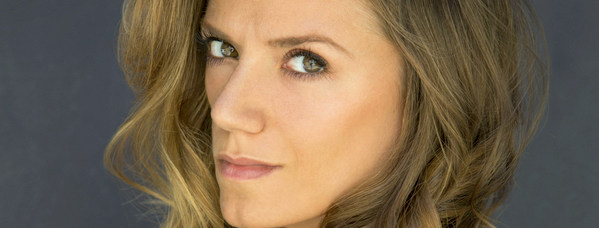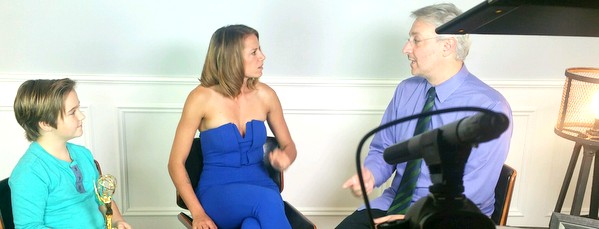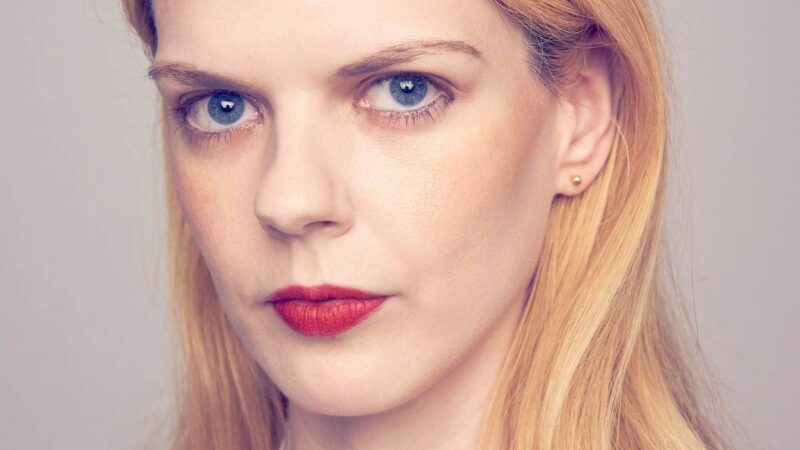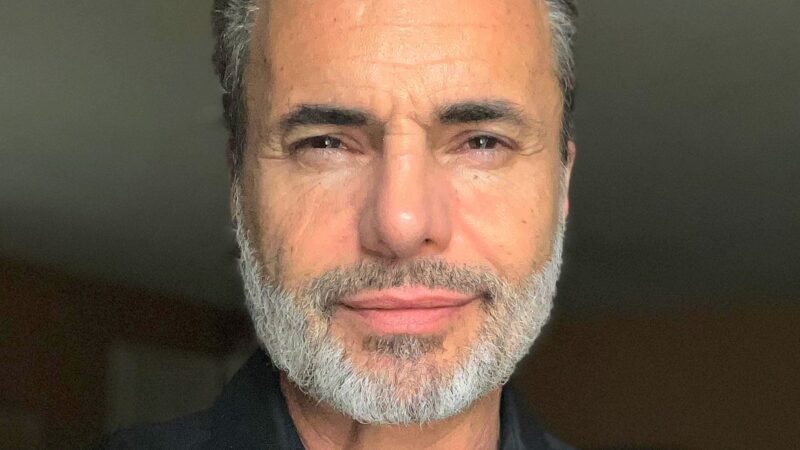
Natasha Pearl Hansen has performed her whole life, starting with plays and choir in church, and other endeavors that don’t count on our adult resumes. However, it was dance that first allowed Natasha Pearl Hansen to be really comfortable on stage. Free styles of dance like modern, lyrical, jazz funk and hip-hop were favorites as you often were allowed to let your personality come through in your movements. Natasha Pearl Hansen noticed a personal love for comedy hatching in high school while being a teacher’s assistant in a speech class for one of her favorite teachers, Mrs. Shumate. She allowed us to take our opinions and have fun presenting them to others through speech and debate. As a teacher’s assistant for the younger class, Natasha Pearl Hansen had to give examples of upcoming speeches, and she was allowed to test out everything from (attempts at) Michael Jackson dances, to trying to convince everyone that breast implants are slow killers. Natasha Pearl Hansen also began keeping a journal in her early high school days of funny quotes, stories, and situations among herself and friends, and she would ‘LIVE story-tell’ at parties to entertain the older kids, and to give them a reason to invite her to their parties. It was around then that Natasha Pearl Hansen started realizing that relating to others through story and having a sense of humor would be her money-makers.
Thanks to @NPHcomedy for being our hilarious feature at this weekend’s #thecomedypalace show. #SanDiego pic.twitter.com/DETVM2gqZ2
— Comedy Palace (@comedypalace) April 25, 2016
What did you study what you do
At the University of Minnesota my minor was theater, and I studied with a number of brilliant professors. One particular professor, Luverne Seifert (I still wonder if he remembers me), taught a theater class where we essentially performed a variety of one-person shows. They could be dramatic, comedic, weird… whatever we wanted! I created a bit based on my grandmother and her twin sister baking cookies over the holidays. I would go behind a wall and change hats and play their banter with each other. I found inhabiting a character to be ridiculously fun. My sophomore year at the U, a professor of Shakespeare noticed my knack for improvising my way through lines I had failed to memorize, and she suggested I check out improvisation, which I had never heard of before. That summer I googled ‘improv,’ found Second City Chicago, and that was the end to my University of Minnesota life and the beginning of a new era, Chicago comedy. Studying at Second City Chicago, I really began to see the full spectrum of my options in the world of comedy. There were so many different ways to approach humor that weren’t available in traditional college acting courses; short and long form improvisation, sketch comedy, stand-up, writing, directing, producing; the opportunities were endless! All of it intrigued me, and I wondered where my brain would find it’s home. While in the conservatory program at Second City, I started taking shots at directing and producing. I directed and produced my first one-act comedic play put up at the Gorilla Tango Theater in Chicago, where they allowed up-and-coming creators of all kinds to experiment with new bodies of work. Learning how to manage a stage play was vital in eventually transitioning into film. I noticed that I loved having control of the projects I worked on, hence the later transition into producing.
 Describe your filmmaking process
Describe your filmmaking process
Since I tend towards the genre of comedy for the majority of my work, my process is pretty basic: ground myself in truths. If I’m playing a character, I try to think in what ways I am like or not like this character. I’ll try to think of people I’m close to that have beliefs and values like this character and think about the ways they would react to things. I’m a story-teller, so I have to really SEE the world I’m in rather than just pretend to be in it. As far as stand-up goes, my process has always been more improvisation based, as that’s where comedy really began for me. I’ll think of the particular story I want to tell, find the beats I think are most dynamic, and figure out what point I’m trying to make by the end. Everything in between I generally improvise through on stage until I get the joke or story cleaned up and concise. “Trim the fat.” Same goes for creating scripts, character breakdowns or treatments.
Tell us about the work you have produced
As far as projects I produce, they always have to have a specific meaning to me. I choose to work on projects either with peers that I respect, with issues that matter to me or those close to me, or projects that I created. There is no formula to being in this business, both as an actor and a producer. In order to truly grow, you have to constantly be evolving with the business itself. Work does not always come in a specific order, nor is it possible to pick someone else’s path and recreate it. You don’t necessarily book a local commercial, then book a national. You don’t necessarily book a small indie feature, then a studio blockbuster. There is not always a rhyme or reason to the order in which things happen in your career, so you have to be open to projects on an individual basis rather than thinking, “I booked this, so now I have to book that.”
 Do you take courses to improve your craft
Do you take courses to improve your craft
I’m constantly doing anything possible to improve my craft, without question. Everything from private audition coaching, to constantly being on stage working out new standup material has helped me stay on top of my game. I have sat in on numerous pitch meetings over the years as well to get a feel for the flow of these meetings, and so that when I’m in the position to pitch, I’m ready and know what questions to be able to answer. I meet with producers and production companies constantly. I make sure I’m informed of the ways technology is changing, and I educate myself on how content is currently being distributed. I hang out on sets friends are working on. I read Deadline, Variety and Splitsider daily, along with a number of other publications. I honestly do anything and everything that can to provide myself with a better understanding of comedy, film, television, networks, casting, distribution, current programming, and the entertainment business as a whole. I always want to be aware of the next steps to take with my career and keep a clear focus, while also having as much knowledge about ‘what’s out there’ as I possibly can.
How do you combine acting and producing
Combining acting and producing is ridiculously fun for me because my brain is oddly both creative and extremely technical. I love having to bounce between roles on a shoot as it gives me a break from both jobs. Also, particularly due to my background in improv, I have a knack for wanting to take care of people and work as a unit both on and off camera. I truly want to see the project succeed as a whole. Every moving part of a film or show matters, and there is no insignificant role. I equate it to being the general manager of a restaurant; the best ones are always those who have worked every other possible job previously. Being an actor and having worked and continuing to work on the other side of the lens as well gives me such an appreciation for what’s happening around me, and that feeling of gratitude for all the pieces of the filmmaking puzzle makes the entire process so dang enjoyable.
 How did you get into the film business
How did you get into the film business
When I moved to Los Angeles, It became clear that just being ‘good’ at something wouldn’t cut it. I needed to be valuable. For me, creating value for myself was giving myself knowledge of the entertainment industry so that I would understand all the parts of the machine. I also knew that if I was just an actor, I wouldn’t necessarily be chosen for roles I saw myself in. But, if I was a creator, that gave me control and allowed me to let my voice be heard without being dependent on being cast in someone else’s script. I started offering my time to producers and directors that I had met through Second City, the stand-up scene, or general auditions, and coming to help them either on sets or in classes they taught without pay. It was a great way to get hands-on experience, and see how things worked and moved in a production. I eventually paired up with my first producing partner to create Wonderland Motion Pictures, and we worked on a plan of action to acquire the equipment, talent, financing, and to create scripts. Then we started making things happen! It’s absolutely a slow process, but now we have a great system and it only gets better and smoother with time.
How do you create characters
Whether I’m writing a character or playing one, the first thing that I care about is the backstory. Where did they come from? What was their upbringing like? What kind of people do they choose to be surrounded by? What kind of life-altering choices have they made that make them think the way they do? I basically ask the character questions and try to answer them. People are more interesting the more that is revealed about them, so I focus on creating what can eventually be revealed. In comedy, creating characters is such a blast because you know their stakes have to be high. Everything has to be the ‘biggest deal’ in comedy, so I think of what ways these people would react to simple annoyances. If thinking of their reaction reminds me of someone I know or have met, or if said reaction actually makes me laugh out loud, I know I’ve created something good.
 Explain your acting process
Explain your acting process
I’m a very turn it on, turn it off type of person. I have mad respect for method acting, but it’s not something I find works for me in particular. I have more fun with a character when I can bounce in and out of it, and I really focus on remembering that whenever I’m performing, whether on stage or in front of the camera, I should be having the most fun ever! Playing an interesting and layered character to me is exactly that; PLAYING. It HAS GOT to be enjoyable. It’s such a relief that we, as performers, have the option to step out of reality and into a fantasy land as often as we get to. I cherish the moments I get to play. It’s freeing.
What tip or ideas can you give young actors
Do. Do everything. Try everything. Be well rounded. Figure out what does and does not work for you as someone who desires to create for a living. Constantly challenge yourself and do things out of your comfort zone, because you may end up finding a niche of the art world you didn’t know existed. Always make sure you are doing something to be better than you were yesterday, because if you think you’re the best today, you have nothing to aspire to tomorrow. Treat people as your equals and be respectful. Remember when you loved working with a person and stay in contact with them, or create a piece that you think they’d like to work on and ask them to join you in your endeavor. Always always always remember that you do not have to say yes to every job (like many of us *ahem* do in our early days), and you do not have to choose to work with mean people (although sometimes, whether we like it or not, that can be unavoidable.) Everything is a choice when it comes down to it. Realize that if this is your career, there will be moments that are the best moment ever, as well as the worst moment ever, as would happen with any career path you’d choose. Remember that everything is out of your control,especially when it comes to casting, so take nothing personally. Convince people through your charisma that you are right for the job. Hard work always pays off in some way. Be bold! Create! If you don’t like what’s out there, make something you do like. Ignore crappy people, because they happen, but great ones do to, so pay attention to them instead. And, never never never give up on your dreams.
Describe what it is like to work in the film business
Working in entertainment period has it’s ups and downs, but overall you have to make it a choice to focus on the great parts. Los Angeles is a very trying city, and there are many difficult people and disappointing moments. However, in this town I have found some of the most dedicated, talented, creative, hard-working, diligent, hilarious, intelligent, respectable, incredible people that I couldn’t imagine a life without knowing. Really honing in on that, and being conscious of how blessed you are to be in a place that’s constantly challenging you creatively, that’s what makes the often paycheck to paycheck life worthwhile. The most important thing, no matter what city you live in, is that filmmaking is just that; film making. Content is king. In order to stay on top of the game, you have to constantly educate yourself, think outside the box, keep an open mind, and always be creating.It’s a very intriguing business. Some people are in it for the wrong reasons, but so, so many are in it for the right ones. People worldwide are creating amazing bodies of work all the time. It’s so fun to always be creating. Being in and going to film festivals has got to be one of my favorite parts of the business itself, as that’s where you not only get to showcase projects and watch people’s reactions live, but festivals also allow you a chance to meet other people who are constantly creating as well. It’s so amazing to see what is out there in the world and to be able to understand what’s important to all the people on this planet through cinema and live art.
What do you want to change about the film business
There are plenty of things about this business that I wish worked differently, such as auditioning, landing representation, and getting in ‘rooms’ you want to get in, but over time I’ve come to realize these processes are in place for a reason, and eventually those reasons do begin to make sense. My biggest challenge in the past has been more from the producer’s role, and finding funding for projects. That is still a work in progress, but again it comes down to having a track record of creating solid content in order to fund bigger and better projects. Also, with fundraising platforms like Kickstarter, many first time producers and directors are seeing their financing dreams come to pass much sooner than ever before. Just as any business, there is always room for improvement, but if you’re willing to keep working and advocating for yourself, your projects, and your people, you and your like-minded peers will all rise together, and it makes changing your approach to the business the priority over changing the business itself.
My second piece with @MensHealthMag ! 5 page photo spread with fun insight from yours truly…http://t.co/k4iW3UOOTT pic.twitter.com/TyCuwTaySh
— Natasha Pearl Hansen (@NPHcomedy) August 5, 2015
How do you want to be remembered
At the end of the day I care the most about who people are at the core. I hope people first and foremost will think of me and be able to say that they were happy to know me. I hope I make an impact on people in their personal lives, and I hope my humor can bring people together in a positive way. I want to be trusted and respected by my friends, peers, and audiences. I hope my stories live to be far older than my body does. I hope when people see work of mine they will feel like it’s honest, and without question the voice of Natasha Pearl Hansen.
Website | Facebook | Twitter | IMDB | NPH | Soundcloud | Instagram







